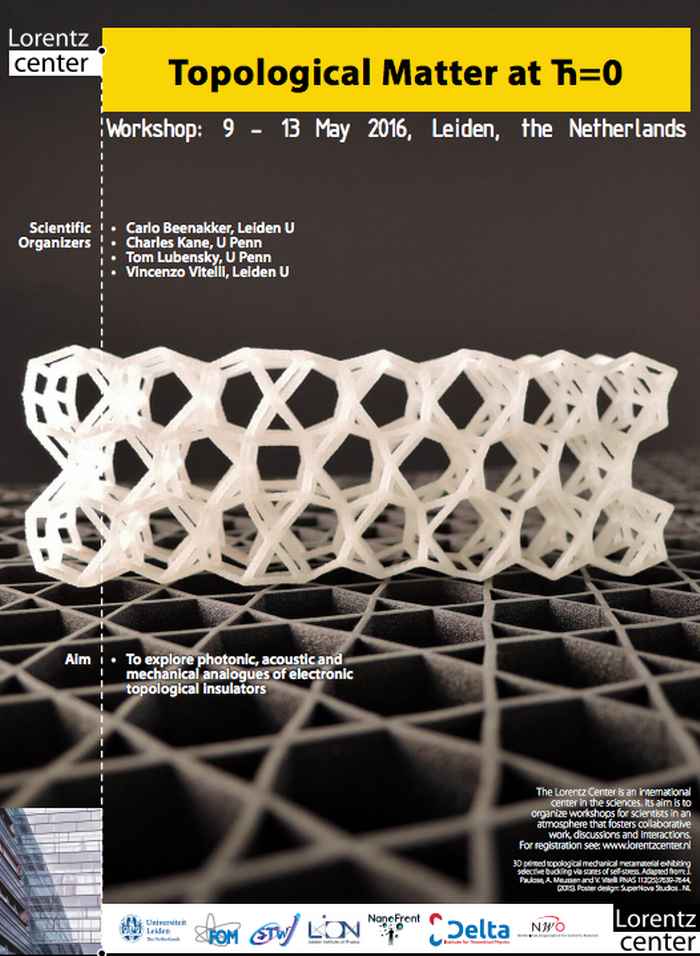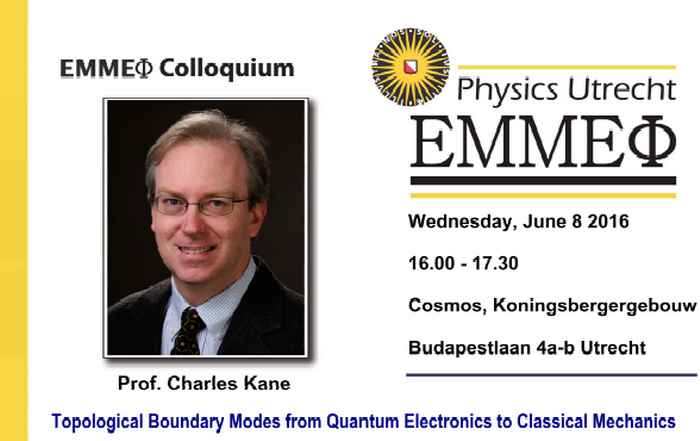Charles Kane: Lorentz Professor 2016
2 May 2016

Prof. Charles Kane (University of Pennsylvania) is a world-renowned American physicist who has made major contributions to theoretical condensed matter physics. He is most famously known for discovering topological insulators in the mid-2000’s. For his work on this subject he received the Dirac Medal of the International Centre for Theoretical Physics in 2012, along with two colleagues.
Lorentz Center Workshop on Topological Matter at hbar-zero
Charles Kane is one of the organisers of the Lorentz Center Workshop Topological Matter at H-Zero: Photonic, Acoustic, and Mechanical Analogues of Electronic Topological Insulators
from 9 May 2016 through 13 May 2016.

Aim and description
Topological phases of matter have recently made their way from the quantum realm of electrons to the classical world of light, sound, and mechanics. Much to the surprise of the quantum mechanical community, the topological effects survive in the classical limit. Common to these new developments is the presence of robust edge modes that owe their existence to integer-valued quantities (topological invariants) characterizing the interior of the system.
The translation of quantum mechanical concepts to classical waves calls for an integrated approach, that will proceed most effectively if researchers with expertise in electronic topological materials are brought in close contact with all three fields of optics, acoustics, and mechanics. The program of this workshop will be structured with that aim in mind.
Scientific Organizers
- Charles Kane & Tom Lubensky (Philadelphia)
- Vincenzo Vitelli & Carlo Beenakker (Leiden)
Lecture series: Symmetry Topology and Phases of Matter
During his stay in Leiden, Kane will give a series of three lectures on 'Symmetry, Topology and Phases of Matter' in the De Sitter room (Oort building). The lectures will provide a pedagogical introduction to topological band theory and discuss its application to symmetry protected electronic states including topological insulators, semimetals and superconductors. Would it be possible to apply related ideas to mechanical systems?
- Tuesday 17 May, 13:45-15:30 I. Topological Band Theory of Insulators and Semimetals
- Tuesday 24 May, 13:45-15:30 II. Topological Superconductivity
- Tuesday 31 May, 13:45-15:30 III. Topological Mechanics
Location
Oort Building, De Sitter Room. Niels Bohrweg 2, Leiden
Colloquium Ehrenfestii: Wednesday 18 May, Leiden
On Wednesday 18 May, prof. Kane will give the Colloquium Ehrenfestii. The Colloquium starts at 19:30 hours in the main auditorium of the Oort building.
Abstract
Symmetry and topology are two of the conceptual pillars that underlie our understanding of matter. While both ideas are old, over the past several years a new appreciation of their interplay has led to dramatic progress in our understanding of topological electronic phases. A paradigm that has emerged is that insulating electronic states with an energy gap fall into distinct topological classes. Interfaces between different topological phases exhibit gapless conducting states that are protected and are impossible to get rid of. In this talk we will discuss the application of this idea to the quantum Hall effect, topological insulators, topological semimetals and topological superconductors. The latter case has led to the quest for observing Majorana fermions in condensed matter, which opens the door to proposals for topological quantum computation. We will close by surveying the frontier of topological phases in the presence of strong interactions.
Time
19:30 - 20.30
Location
Oort Building, Main Auditorium. Niels Borhweg 2, Leiden
Delta Quantum Topology Meeting: Friday 27 May, Leiden
At the Delta Quantum Topology Meeting on Friday 27 May, prof. Charles Kane will give a lecture on Symmetry Protected Topological Insulators and Semimetals.
Abstract
We will discuss recent developments in topological band theory, in which the combination of time reversal symmetry and crystal symmetries lead to novel insulating and semimetallic states. We will discuss weak topological insulators and topological crystalline insulators along with their symmetry protected surface states, as well as bulk topological semimetals that feature point and line nodes in their electronic structure that are protected by symmorphic and/or non-symmorphic space group symmetries.
This event is part of a regular series of meetings on Quantum and Topological Matter, sponsored by Delta ITP. The objective is to bring together the theoretical physics communities in Amsterdam, Leiden and Utrecht. Researchers from different areas in theoretical physics are very welcome to participate.
Other speakers are:
Lars Fritz (Utrecht)
Universality and scaling in a charge two-channel Kondo device
Jorrit Kruthoff (Amsterdam)
Current status of the classification of topological phases
Location
Leiden University, Huygens Laboratory, Room HL 2256/228
EMMEPH Colloquium: Wednesday 8 June, Utrecht
On Wednesday 8 June, prof. Kane will give the EMMEPH Colloquium in Utrecht, Topological Boundary Modes from Quantum Electronics to Classical Mechanics.

Abstract
Over the past several years, our understanding of topological electronic phases of matter has advanced dramatically. A paradigm that has emerged is that insulating electronic states with an energy gap fall into distinct topological classes. Interfaces between different topological phases exhibit gapless conducting states that are protected topologically and are impossible to get rid of. In this talk we will discuss the application of this idea to the quantum Hall effect, topological insulators, topological superconductors and the quest for Majorana fermions in condensed matter. We will then show that similar ideas arise in a completely different class of problems. Isostatic lattices are arrays of masses and springs that are at the verge of mechanical instability. They play an important role in our understanding of granular matter, glasses and other 'soft' systems. Depending on their geometry, they can exhibit zero-frequency 'floppy' modes localized on their boundaries that are insensitive to local perturbations. The mathematical relation between this classical system and quantum electronic systems reveals an unexpected connection between theories of hard and soft matter.
Time
16.00 – 17.30 (with a reception after the Colloquium)
Location
Cosmos, Koningsbergergebouw, Budapestlaan 4a-b Utrecht (located in the Uithof of Utrecht University).